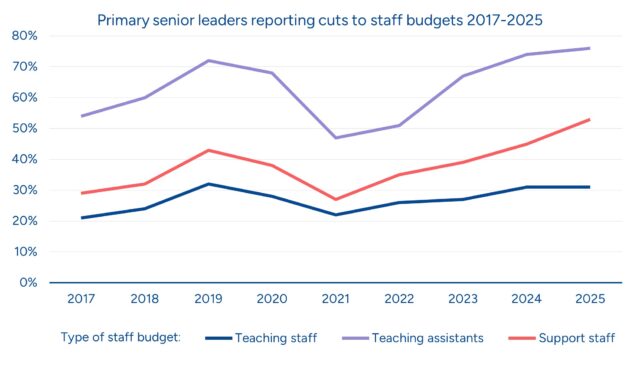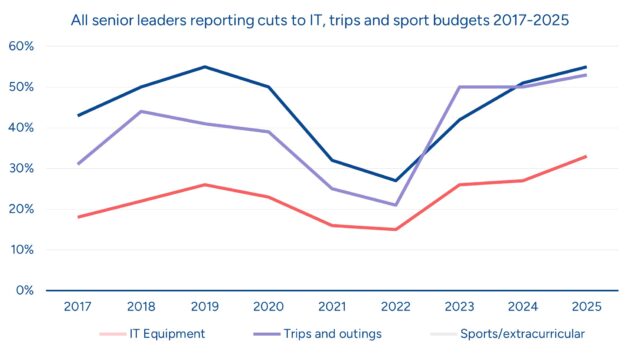Press Releases
Schools are cutting budgets, including on staff, and using Pupil Premium (PP) to plug budget gaps, while less than 10 percent of school leaders say PP funding is enough to fully support eligible pupils. Meanwhile fewer schools are offering in-school tutoring following the demise of the National Tutoring Programme (NTP). These are some of the startling headline findings from our latest research, with polling conducted in March this year.[1]
These striking figures point to a worsening crisis in our schools on budgets for staffing, equipment, extra-curricular activities and tutoring that particularly affect the most disadvantaged. 51% of secondary school leaders said they had cut teaching-staff, 50% teaching-assistant and 55% support-staff budgets for financial reasons over the last year. At primary level, 76% of leaders said they had cut their teaching-assistant and 53% support-staff budgets, both the highest levels since we started this polling in 2017.

In our polling, a record high proportion of secondary leaders (45%) also reported using PP funding to plug gaps in their budgets elsewhere, with 66% of those saying it was to supplement spending on staff salaries. Similarly, 81% of the primary teachers who said they used PP funding to plug budget gaps used it for teaching assistant salaries.
These figures point to a range of shocking pressures on school budgets, made all the worse by the highest yet levels of schools cutting IT equipment, trips and outings and sports and extra-curricular activity budgets (55%, 53% and 33% respectively). These are cuts that will likely hit lower income students and pupils with special educational needs and disabilities (SEND) the hardest, as well as those struggling the most academically.

Other budgetary cuts are likely to exacerbate these challenges. Pupils from lower income families are less likely than their wealthier peers to have access to IT equipment outside of school, they are less likely to go on cultural or educational trips with their families and are less likely to participate in commercial extracurricular activities like music or dance lessons and arts or sports clubs. Previous Sutton Trust research found that 84% of children from professional families participated in at least one after school activity compared to 45% in working class families. Consequently, schools have a crucial role to play for disadvantaged pupils not only in curricular teaching but also in providing broader cultural and educational opportunities that other children may be getting elsewhere. More cuts in these areas, as reported this year, are only going to further disadvantage the already disadvantaged.
This all comes at a time when PP funding is in any case widely viewed by teachers as insufficient having seen its value has fall by 20% between 2014/15 and 2021/22. Across all schools, 88% of senior leaders and 73% of classroom teachers said that PP funding was slightly less or much less than the level needed to fully support eligible pupils in the classroom. This should not be surprising. Teachers have known this for years and teaching unions have long complained about inadequate resources for low income and SEND pupils in schools.
This issue has also recently been recognised by parliamentarians. A recent Public Accounts Committee report, also drawing on Sutton Trust research, concluded funds were often not sufficiently focused on supporting the disadvantaged pupils for whom they were intended.
Cuts that schools are making to in-school tutoring provision will also impact lower income pupils, for whom the now abolished National Tutoring Programme was largely designed. This is despite evidence showing that the NTP improved pupil outcomes. In our polling, 37% of senior leaders said they had to stop offering tutoring due to the demise of the NTP. 23% (35% at secondary schools) said they were offering tutoring to fewer pupils and 58% said they were providing much less (three out of five) or slightly less (two out of five) tutoring than in 2023-24.
These figures pose a challenge for the Government’s opportunity mission and its ambition for all children to have equal chances in life, whatever their background. If the Government is serious about delivering this, we need to see a new national strategy to close the attainment gap, including proper funding for in-school tutoring targeted at the most disadvantaged pupils and restoring Pupil Premium funding in real terms to its 2014/15 level.
And to address the recruitment and retention crisis, the existing Levelling Up Premium for qualified teachers should also be increased and extended to additional subjects to better support teachers of key courses in the most disadvantaged schools. While challenging given the wider public finances, June’s Spending Review will need to provide adequate support for the Department for Education, in order to start tackling barriers to opportunity in schools.
[1] The polling was carried out by NFER on behalf of the Sutton Trust in March 2025.